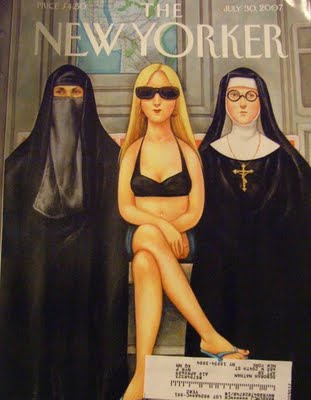
 Over the past couple of months, I have been really impressed by a couple of different book reviews from the New Yorker that center around issues of faith. The authors have not always reached the conclusions that we might hope, but their honesty and insight have been quite striking. Below are a few quotes with links:
Over the past couple of months, I have been really impressed by a couple of different book reviews from the New Yorker that center around issues of faith. The authors have not always reached the conclusions that we might hope, but their honesty and insight have been quite striking. Below are a few quotes with links:
Cumulatively, the commentaries on the Judas gospel are amazing in their insistence on its upbeat character. Jesus ridicules his disciples, denounces the world, and says that most of us will pass away into nothingness. Hearing this, Judas asks why he and his like were born—a good question. Jesus evades it. The fact that liberal theologians have managed to find hope in all this is an indication of how desperately, in the face of the evangelical movement, they are looking for some crack in the wall of doctrinaire Christianity—some area of surprise, uncertainty, that might then lead to thought.
From another article (only the abstract in currently available online) about the well-publicized New Atheists (Dawkins, Hitchins, et al) and the response(s) to them:
For Richard Dawkins, Sam Harris, and Christopher Hitchens, among others, the God most worth fighting against seems to be a hybrid of a cheaply understood Old Testament, a prejudicially scanned Koran, and the sentimentalities of contemporary evangelicalism. For the new atheists, as for many contemporary American Christians, faith is assumed to be blind. The new atheists do not speak to the millions of people whose form of religion is far from the embodied certainties of contemporary literalism. Indeed, it is a settled assumption of this kind of atheism that there are no intelligent religious believers. Oddly, despite God’s general discrediting, serious theological argument is being done by literary and cultural theorists alike. Terry Eagleton’s “Reason, Faith, and Revolution” attacks the new atheism as a kind of secular counter-fundamentalism. It makes a sharp, limited case against Richard Dawkins and Christopher Hitchens, better than any previous book of its kind has. But its own incoherence is symptomatic of the frailty of what might be called the new anti-atheism… Eagleton shows little interest in the central claim of Christian belief that Christ was God incarnate. Jesus is less important to him as the Son of God than as a proto-Marxist. Heaven is not really about a world to come but about the transformation of the world we have.
In the full version of the latter article, which will be online shortly, I imagine, the author goes so far as to say (quoting St. Paul!) that a Jesus who didn’t rise from the dead isn’t worth believing in!

Sign up for the Mockingbird Newsletter
COMMENTS
One response to “Thoughtful Faith Pieces from the New Yorker”
Leave a Reply













That second article by James Wood is fantastic. Hopefully they will post it online soon.